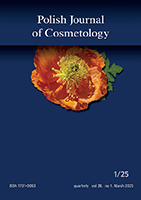search by
Copyright @ Pol J CosmetolDiet as aggravating factor in acne vulgaris - characteristics of etiology and pathogenetic factorAnastazja Okoń 1/, Kamila Michalak 2/, Małgorzata Czerny 2/, Paulina Budzanowska 2/ 1/ Koło Naukowe Wyższej Szkoły Fizjoterapii z siedzibą we Wrocławiu 2/ Wyższa Szkoła Fizjoterapii z siedzibą we Wrocławiu Summary Acne vulgaris is one of the most common dermatological diseases. The pathogenesis of the disease is not unambiguous, which means that many factors, both internal and external, may have an impact on the development and course of the disease - hence it is assumed that this disease is a polyetiological disorder. Getting to know the cause of acne vulgaris is crucial to undertake holistic therapy, mainly the introduction of a proper diet, dermatological treatment, implementation of cosmetic care at home as well as treatments supporting the treatment of acne. This ailment consists of chronic inflammation of the hair and sebaceous follicles, and among the main factors causing the formation of acne, we can distinguish: genetic predisposition, disruption of the functioning of hormonal balance, excessive activity of the sebaceous glands, increased sebum secretion, disturbance of keratinization of the hair follicle orifices, which leads to blockage of the sebaceous glands, colonization of Propionibacterium acnes bacteria within the hair follicle orifices, development of inflammation or improper diet. Key words: acne vulgaris, hormonal balance, sebaceous glands, hair and sebaceous follicles, inflammation, open comedone, closed comedine |




